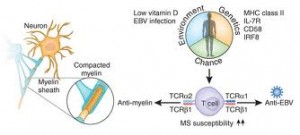Multiple Sclerosis (MS) is a chronic disease, which is dreaded by patients and a puzzle to researchers. While there are MS treatments that control the disease, it remains crucial to treat the early onset. So far the triggering factors have been an unsolved puzzle. Genetic traits and poor nutrition have been implied, yet there has been no conclusive evidence. For a long time there has been the suspicion amongst researchers, that a “multiple sclerosis virus” could be the culprit.
New research, which has been published in the Journal of the American Medical Association shows that the truth is not far off.
Between 1988 and 2000 blood samples have been taken in a study among medical personnel of the United States. Special attention was paid to the group that was granted a permanent disability due to chronic illness. Amongst those who had Multiple Sclerosis, positive blood tests for Epstein Barr virus titers were prominent. The affected individuals were young adults, and the infection with the Epstein-Barr virus had occurred several years before the onset of the illness (the average time between the collection of the blood specimen and the onset of MS was 4 years.) There was also a correlation between the age of the patient and the occurrence of illness. The risk at age 25 was three-fold higher than at age 20 to contract Epstein Barr viral infection. Another strong indicator was an elevated serum level of IgG antibodies to EBNA complex or EBNA-1. This finding was associated with a three-fold risk for the development of MS.
This result would be of interest to young adults who were infected with mononucleosis, as the Epstein-Barr virus, which triggers the seemingly harmless and self-limiting “kissing disease”, seems to entail a higher risk for the development of MS in a younger adult population.
More information on MS: http://nethealthbook.com/neurology-neurological-disease/multiple-sclerosis/
Reference: JAMA Vol293, Nr.20, 2496-2501, May 25,2005
Last edited October 28, 2014






